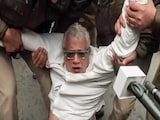The Emergency imposed by the late former Prime Minister Indira Gandhi from 1975 to '77 was a "mistake" and what happened in that period was "wrong", Congress leader Rahul Gandhi said Tuesday at an event organized by Cornell University.
Rahul Gandhi also said the Emergency, during which time constitutional rights and civil liberties were suspended, the media was severely restricted and many opposition leaders were jailed, was "fundamentally different from the current scenario".
"I think that was a mistake. Absolutely, that was a mistake. And my grandmother (Mrs Gandhi) said as much. (But) the Congress at no point attempted to capture India's institutional framework... frankly, it does not even have that capability," Mr Gandhi said in a conversation with renowned economist Kaushik Basu.
"Our (the Congress') design does not allow us (to do)," he stressed.
The ruling BJP - whose leaders were among those jailed during the Emergency - has frequently attacked the Congress on this subject, particularly when faced with accusations it too is curtailing freedom of speech and the right to dissent, and bullying the media into submission.
In June last year Home Minister Amit Shah targeted the Congress and the Gandhis in series of tweets, saying "one family's greed for power" turned the nation into a "prison" overnight.
"The press, courts, free speech... all were trampled over. Atrocities were committed on the poor and downtrodden," Mr Shah tweeted.
However, Mr Gandhi said Tuesday that there was a "fundamental difference" between what happened between 1975 and 1977, and what is happening today - that is, the RSS (Rashtriya Swayamsevak Sangh, the BJP's ideological mentor) is filling institutions with its people.
"So, even if we defeat the BJP in the election, we are not going to get rid of their people in the institutional structure," he said.
"Modern democracies function because there is institutional balance... Institutions operate independently. That independence is being attacked in India (by) one big institution called RSS... being systematically done...would not say democracy is eroding, would say it is being strangled," he added.
Mr Gandhi recalled a conversation with his party leader and former Madhya Pradesh Chief Minister Kamal Nath - before his government was overthrown. Kamal Nath told him, Mr Gandhi said, that senior bureaucrats in his government would not follow his orders as they claimed allegiance to the RSS.
"So, it is fundamentally different what is going on," Rahul Gandhi said.
In December the Supreme Court said it would examine whether the Emergency could be declared "wholly unconstitutional" after so many years. The centre was asked to respond to this issue following a petition filed by a 94-year-old woman.
Mr Gandhi also touched upon rifts within his party - rifts that were highlighted Tuesday in an exchange between Bengal Congress chief Adhir Ranjan Chowdhury and former Union Minister Anand Sharma, who is part of the "G-23" or the group of 23 dissenters who wrote a letter calling for sweeping organisational changes.
"I am the first person that says democratic election within the party is absolutely critical but it is interesting to me that this question is not asked about any other political party. Nobody asked why is there no internal democracy in BJP, BSP and Samajwadi Party," he said.















